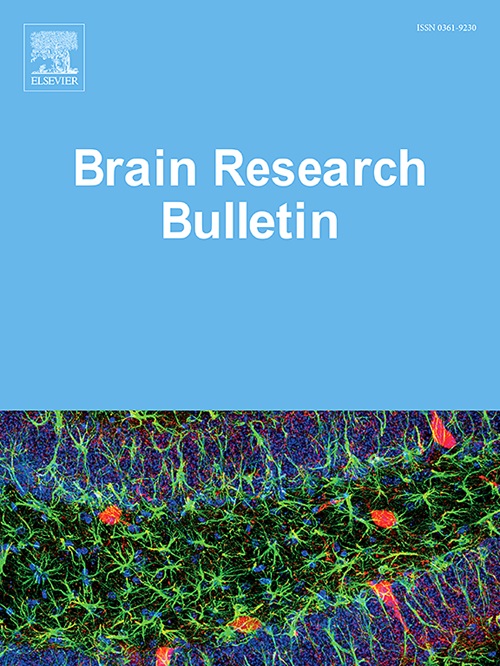三辛酸的抗癫痫和肠道保护作用以及肠道微生物群在癫痫小鼠模型中的关键作用。
IF 3.7
3区 医学
Q2 NEUROSCIENCES
引用次数: 0
摘要
肠道微生物群的结构和功能影响代谢、肠道健康和行为反应,并受饮食因素的调节。最近的研究表明,肠脑轴与癫痫的发病机制有关,从而提供了潜在的新的治疗靶点。本研究评估了三辛烷酸的抗癫痫作用,并探讨了肠道微生物群在慢性戊四唑(PTZ)诱导的癫痫小鼠模型中的潜在作用。通过行为评估、脑电图监测、免疫荧光染色、神经递质检测、肠道微生物群测序、肠道屏障功能测试和粪便微生物群移植(FMT),系统研究三辛烷酸的抗癫痫作用和微生物群的潜在作用。三辛酸能显著恢复慢性PTZ小鼠的胶质细胞增殖至正常水平。此外,三辛烷酸通过恢复Dubosiella和Faecalibaculum属的丰度,上调结肠紧密连接蛋白的表达,降低炎症标志物的升高水平,降低PTZ小鼠海马中升高的谷氨酸水平,改善肠道微生物群失衡和肠道健康。抗生素(Abx)预处理消除了三辛酸的抗惊厥保护作用。虽然FMT实验没有将抗惊厥保护作用转移到Abx+PTZ组小鼠,但结果表明FMT仍然部分恢复了慢性PTZ诱导的癫痫小鼠模型的肠道微生物群失衡。这些结果为基于饮食和肠道微生物群的癫痫治疗策略提供了新的见解。本文章由计算机程序翻译,如有差异,请以英文原文为准。
Anti-epileptic and gut-protective effects of trioctanoin and the critical role of gut microbiota in a mouse model of epilepsy
Gut microbiota structure and function affect metabolism, gut health, and behavioral responses and are regulated by dietary factors. Recent research suggests the association of the gut-brain axis with epilepsy pathogenesis, thus offering potential new therapeutic targets. This study evaluated the anti-epileptic effect of trioctanoin and explored the potential role of the gut microbiota in a chronic pentylentetrazol (PTZ)-induced seizure mouse model. Behavioral assessments, electroencephalogram monitoring, immunofluorescence staining, neurotransmitter detection, gut microbiota sequencing, intestinal barrier function tests, and Fecal Microbiota Transplantation (FMT) were performed to systematically study the anti-epileptic effects of trioctanoin and the potential role of microbiota. Trioctanoin significantly restored glial cell proliferation to normal levels in chronic PTZ mice. Moreover, trioctanoin reduced elevated glutamate levels in the hippocampus of PTZ mice and improved gut microbiota imbalance and gut health by restoring the abundance of Dubosiella and Faecalibaculum genera, upregulating tight junction protein expression in the colon, and decreasing elevated levels of the inflammatory markers. Antibiotics(Abx) pre-treatment abolished the anticonvulsant protective effect of Trioctanoin. Although the FMT experiment did not transfer the anticonvulsant protection to the Abx+PTZ group mice, the results suggest that FMT still partially restored the gut microbiota imbalance in the chronic PTZ-induced epilepsy mouse model. These results provide new insights into dietary and gut microbiota-based therapeutic strategies for epilepsy.
求助全文
通过发布文献求助,成功后即可免费获取论文全文。
去求助
来源期刊

Brain Research Bulletin
医学-神经科学
CiteScore
6.90
自引率
2.60%
发文量
253
审稿时长
67 days
期刊介绍:
The Brain Research Bulletin (BRB) aims to publish novel work that advances our knowledge of molecular and cellular mechanisms that underlie neural network properties associated with behavior, cognition and other brain functions during neurodevelopment and in the adult. Although clinical research is out of the Journal''s scope, the BRB also aims to publish translation research that provides insight into biological mechanisms and processes associated with neurodegeneration mechanisms, neurological diseases and neuropsychiatric disorders. The Journal is especially interested in research using novel methodologies, such as optogenetics, multielectrode array recordings and life imaging in wild-type and genetically-modified animal models, with the goal to advance our understanding of how neurons, glia and networks function in vivo.
 求助内容:
求助内容: 应助结果提醒方式:
应助结果提醒方式:


